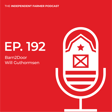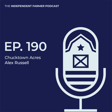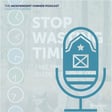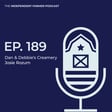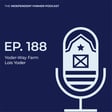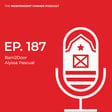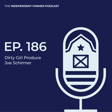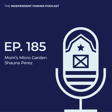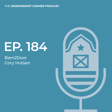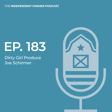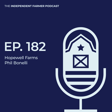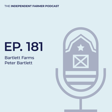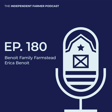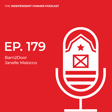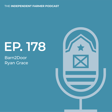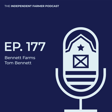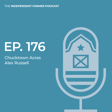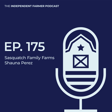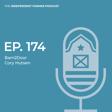Become a Creator today!Start creating today - Share your story with the world!
Start for free
00:00:00
00:00:01

Farmers Market Best Practices with Bennett Farms
In this week's episode, James sits down with Tom of Bennett Farms (MI) to discuss Farmers market best practices. From choosing the right Market to how much product to bring, Tom now successfully serves 20+ Markets.
Find moreFarm resources, visit: barn2door.com/resources
Transcript
Introduction to the Independent Farmer Podcast
00:00:10
Speaker
Hello and welcome to the Independent Farmer Podcast, the go-to podcast for do-it-yourself farmers who are taking control of their own business, skipping the middleman, and selling direct to local consumer and wholesale buyers. This podcast is hosted by Barn to Door, the number one business tool for independent farmers to manage their business, promote their brand, and sell online and in person. Let's dive in to today's Independent Farmer Podcast.
00:00:43
Speaker
Welcome to the Independent Farmer podcast. I'm James, the COO of Barn to Door and your host for today's episode. As many of your listeners may be aware, Barn to Door offers an on-one business solution for independent farmers who are cutting out the middleman and taking control of their business, selling under their brand and making sure their customers can purchase from their farm, both online and in person.
Best Practices for Selling at Farmer's Markets
00:01:04
Speaker
Today's conversation, we're going to get into some of the best practices for selling in person at the farmer's market.
00:01:10
Speaker
And today I'm happy to welcome back Tom Bennett of Bennett Farms, Michigan. He is a part of our farm advisor network and has worked with us for several years. Since becoming advisor, he's brought a lot of knowledge on building a successful farm business to our listeners. Tom's enjoyed some success, not just online, but also in-person and being able to convert those in-person buyers to online buyers. So we're going to dig into that topic in more detail.
00:01:36
Speaker
So today I'm excited to dig more into all the best practices. Tom has to share what to to do and also what to avoid. Welcome Tom. It's great to see you again. Hey, thanks for having me back again, James.
Tom Bennett's Journey to Farming
00:01:47
Speaker
Well, Tom, for our listeners who are joining us perhaps for the first time and don't know your story, let's rewind a little bit and tell us a little bit about yourself. And yeah, obviously you previously served in the military too, before becoming a farmer. So I'd love to hear a little bit about your journey before becoming a farmer. And since you've gotten started.
00:02:04
Speaker
Yeah. I joined the Marine Corps in 2001, summer of 2001, right out of high school. I did that for about 10 years. Once I got out of a military service in 2010, moved back home, got a regular job just to kind of support myself while, you know, at the time I wasn't a hundred percent sure I was going to be a full-time farmer at that point. We were just more looking at raising food for ourselves and our family.
00:02:28
Speaker
And then in 2012, I think I started raising my first animals ever. And then by 2016, we had people asking us to raise animals for them. And I'm like, well, maybe we can make some side money here, something to do. And it just kept growing every year. And 2018, I quit my job, my all farm job to farm full time. So that's kind of how the farm grew. Wow. What inspired you to go into farming, you know, outside of just raising food for yourself? I mean,
00:02:53
Speaker
I know you have a big family too. Were you looking at like a feeding your own kids? I mean, you've got yeah what six kids, right? So that's a lot of mouths to feed. Yeah. Yeah. We've always been more country type of people. Every one of my family's always, you grow up, you buy some acres and none of us have ever lived in town per se. So it made sense for us to why not put some animals on it and do something with it. Just more as a hobby at the beginning, I would say.
00:03:18
Speaker
I started to see opportunity in it because of the demand and I wasn't even trying at that point. And I'm like, well, let's just, you know, and grew it on the side until it got so big that I couldn't keep doing it as a side thing. I either had to scale it back or quit my regular job and put everything I had into making the farm business work. And I went that route. Well, that's a big leap of faith, right? You must've had a lot of demand, but you know, balancing the number of hours you're having to work off farm.
00:03:45
Speaker
and switching to moving on farm full time. How did you make that transition? right I mean, that must have been a really tough year, I imagine, to make that transition. Yeah. I mean, it was scary. You know, we had six kids all in middle and high school. Well, most of them were in middle school at that time. So we had a lot of mouths to feed. And the condition with my wife was like, if you want to do this and chase this dream, like that's fine, but your income level better not change. You know what I mean? And I've, I've totally understood that. Like I'm not going to make my family suffer so I can do what I want with my midlife crisis or whatever the heck was going on.
00:04:20
Speaker
You know, so from day one, like I had to focus on being profitable and making money. I couldn't take two years of losing money while I grow the farm. And you know, so we had to make money from day one. So I think that kind of helped knowing that I had to be profitable and make it work. And b you've got to scale quickly to do that because you only get to keep, you know, as profit, so many cents from every dollar that you turn over.
00:04:45
Speaker
So how do you make more money? You better turn over more dollars because that's the only way. you know You can only stretch so much profit out of each pound of meat that you sell because you'll start to lose volume once your your pricing gets so high that it's unobtainable even for the people that want to be able to support you. So we were never the cheapest person in our sector, but we were probably never the most expensive either. A lot of those people that are like super expensive,
00:05:13
Speaker
They are only raising a few hundred birds a year or maybe a thousand chickens a year. You know what I mean? Their supply is so limited that they don't really care because they're going to sell it all anyways at that price, but we need to move like 12,000 chickens a year. yeah here So I would rather sell 10 packs of chicken breast, you know, at $12 a pound for boneless skinless breast, then sell two packs of chicken breast at 16 pounds. I'm going to make more money on the day that way. So it's kind of a volume thing too, at a certain point.
00:05:42
Speaker
Yeah. So that's a big transition to your point, right? And I think a lot of farms, as you mentioned, they're just trying to cover the cost on the products that are not actually making sure that they're actually having a viable income. And I love to come to Jesus conversation with your wife, right? Or she had with you of like, Hey, you must ah produce an income. It can't decrease because we've got, you know, six kids and you probably were probably thinking about kids, perhaps going to college, that type of stuff. I mean, those are real expenses to think about.
Entering and Evolving in the Farmer's Market Scene
00:06:09
Speaker
So when you made that switch, tell us a little bit about your business strategy for growing your farm business and how farmers markets played a role in your initial growth.
00:06:20
Speaker
Yeah, I had already seen, started in 2016 or 17, we did our first like local farmer's markets. Actually, our first farmer's market wasn't even a market, it was a campground, a pretty popular campground in our area. And there was a lady selling baked goods up front at the entrance, and I'm like, I wonder if I can sell brats there. you know I just took 15 flavors of brats, that's all I took.
00:06:40
Speaker
And then I said to myself, if I can't sell bratwurst to 2000 people cooking over fires, like I'm in the wrong business. This is the prime place to do it. And I did, I did well on the side. So that was kind of our testing it out. And I saw that there was money in like the direct to consumer route with farmers. You know, we picked up farmer's markets quickly and we had a number at a farmer's market that was profitable. And I said, okay, this is profitable. Now I just need to do it 20 more times. So.
00:07:10
Speaker
Right now we do 29 farmers markets a week across three states and that's kind of where that came from was because it's like you're getting paid today. It's easy money. I mean, as far as it's not easy to go to a market. There's a lot of logistical stuff involved in it, but it's a quick return, you know, and that's where we meet people face to face and send them to our online store. And we still just focus primarily on farmers markets with most of our energy.
00:07:35
Speaker
And then we convert those customers into online customers that get us through the winter. Cause the winter is rough too. I mean, yeah we'll we'll go from, you know, summer to winter and sales just drop off after October from the markets. So we really need to do a good job converting those customers all summer long to keep shopping with us through the winter. So that way we can continue to be a full-time farm. Yeah. For our listeners again, just a reminder.
00:07:58
Speaker
Tom's farm is in Michigan. So when he talks about winter, we're talking about severe winters, right? It's very different than being in farmer perhaps in Florida or Georgia or Southern California where you can be farmers markets year round. You're not going to get the foot traffic in the middle of the winter in Michigan. You know, people are digging out of snow quite a bit. Well, let's talk a little bit more about the experience you've had because you've obviously have grown your business quite significantly over the years. As you mentioned, you're now up to 29 markets per week at the height of the season.
00:08:28
Speaker
So there's obviously a lot of steps have to go into preparing to go to market. Second, how do you activate your team at the market? And then number three, what do you do after being at the market? So let's start first. Let's break this down to each of the three steps. Let's talk a little bit about prep. What do you do in terms of prep before going out to a market, right? So what are the three to five things you think about?
00:08:51
Speaker
as you get prepped for the market each week? So probably the biggest thing is the the restocking of the market. Coolers, we take 10 30 court coolers to each market. They have placards on the front. Our model is a little bit unique compared to to most farms. um Ours is more of a customer helps themselves to their selection model. So we take 10 coolers, we sit them out front of the tables, like in ah an H shape, almost where they can access it from both sides and in the front of them. And they just pick out what they want, jump in line and throw it down on the table and wring them out.
00:09:21
Speaker
and that worked really well when we're busy as well because multiple customers can be shopping at the same time while we're ringing people up and it's a pretty efficient way to do it at the market as opposed to where, you know, if you're taking a chest freezer and you've just got a chalkboard on the front that says what you got and how much it is per pound and then if someone wants to see a roast or something, they're not real committed but they want to see it.
00:09:41
Speaker
Now they gotta watch you dig to the bottom of your chest freezer and find it just for them to say, oh, that's a little bigger than I wanted. Now pass. And then the customer kind of feels bad because they didn't get it. You just did all this five minutes worth digging for it. You know, I would assume, and that might discourage them from ever asking to see the roast in the first place.
00:09:58
Speaker
you know, so by making it accessible, they can look at our products. If they don't want to engage with us, they don't have to, you know, we'll say, hello, how are you doing? Looking for anything special today? Have you shopped with us before? Just kind of tell them the prices are right on each package by weight. So that's super convenient for them. So, yeah, pre-filling those coolers, though, is one of the biggest things that we have to do all week. It's a constant, we're constantly behind on it. We refill them all on Monday and all on Friday. And then throughout the week, we have to constantly refill them for the weekday markets.
00:10:27
Speaker
So, cooler prep, we made that efficient by, we have several walk-in freezers, so we can fill those coolers anytime we want during the week and then just stack them in the walk-in freezers ready to go. So, when the vans go out in the morning, we just throw those straight in the van. It's pretty simple. I can get a market out of here in 10 minutes, you know, making sure they got their cash box and their point of sale.
00:10:48
Speaker
And got it every every market setup has like a tote that has all of their stuff in it. It's the same for every every market we do is the exact same setup. So our employees, they don't have to have ever been to that market before to know how to do it. All they need to know is where their booth's at and they're set. Got it. So you have consistency in the setup. so Consistency with our setup. it's they're They're all identical. So I can train you at any market.
00:11:12
Speaker
And then you can go out your first day to work at a market you've never even been to. And it's going to be exactly the same as the other one you did. You know, just your scenery around you is going to be different, but our market's the same. Got it. So you have a consistent setup in terms of the structure, in terms of how you lay out your coolers at the market on your tables. And then like you said, the consistent cash box, everything, the OS that they take with them to go. So you've got like a special box ready for them to go each time. That's great.
00:11:40
Speaker
Well, you mentioned the chest freezer and having to dig and like what you've seen perhaps some other folks do. It sounds like some of those are some mistakes that you've seen others make or perhaps things you've learned along the way, you know, that wait, quote unquote, waste time at the market or may inhibit a buyer from coming up and digging through and looking at product yourself. Are there two or three other things like that that you can come to mind with?
00:12:00
Speaker
Yeah, yeah. I would say one one more thing on the chest freezer. I don't want to say it's a necessarily a mistake. I mean, there's successful farms doing it. It's just, it's hard to scale because if you go to markets like maybe, i I think that my sales are going to be 30% higher than yours if we're apples to apples because I'm going to pull in more customers because it's more inviting my way, but they're still going to do okay with chest freezers, but you can't do 29 markets a week with chest freezers. I've got eight markets going simultaneously.
00:12:26
Speaker
on any given day and you know Saturday and Sunday we have eight going at the same time and if you're using chest freezers now you're talking about you need like straight trucks and box trucks and u-haul type trucks to put these in you know on ramps and things like that and it's hard to scale that because we can put our market set up in small transit connect vans So I would say another tip that will be useful for going to market for people is you need to maximize your vehicle usage efficiently. So we don't send out markets
00:13:00
Speaker
typically that goes solo. So most of the vehicles that leave here, we're doing, we're putting two markets in the van and then we're putting a trailer behind the van. So we've got three markets with that one vehicle going that direction. wow When we sign up for our markets, we chain them together. So they might drop in South Bend, drop at Buchanan in the South Haven.
00:13:19
Speaker
And then South Haven, when they're done, they pick back up, you can, and they pick back up a South Bend. So we're maximizing our vehicle usage that way. And I'm conscious of that when I'm signing up for markets in the spring. I'm like, okay, how do these pieces fit? We've not signed up for markets that might be pretty good just because they would have to go solo because nothing else works with them. And you don't want to waste a vehicle on that.
00:13:40
Speaker
How do you do it with a personnel then? Do you carry all the personnel in the van or do you have a set up crew in the van and then you have the people who are gonna work the market and meet you at the market? How do you how do you orchestrate that piece? They all starting in from our farm. So all the people, if they're starting, that we have a schedule and they know when they're supposed to start. They'll get here to the farm, clock in.
00:14:02
Speaker
And then hopping the van, it should be ready to
Market Day Efficiency and Employee Management
00:14:04
Speaker
go for them. I should have already had that loaded. So they just get in when the whole crew for that van is here and they leave. And the market person is the setup person. So, you know, they pull up to a market, all their stuff gets thrown out of the van onto the curb and it's see you later. And then, you know, they're on their own. They have to set it up. And then the same way with breakdown, they get picked back up. Ideally, they'll have their stuff in a pile ready to go and and just throw in the van and go. so Yeah, we put a lot of responsibility in them, but we also pay them well for that. So, you know, they're getting an hourly wage. We pay them an hourly wage from the time they get to the farm until the time they get back from the farm. But we also pay them a sales commission. That way they have some skin in the game on the sales and they can develop customer relationships. You know, so I want them when they're selling $3,000 worth of product at a market is to be excited about it. You know, like, yes, like another sale.
00:14:58
Speaker
I don't want them to be annoyed that they have to work this hard the whole time they don't get to sit. And just and just get paid an hourly wage. yeah Yeah, so I really want them to be vested and it's cool too because it creates excitement. like We have a group text going for every market day with everyone in the group. That's a pretty efficient way to disseminate information to everyone like, hey, if anyone asks, I know we're out of making the day, we will have it on Thursday. So just got I can send it to everyone, they'll know.
00:15:24
Speaker
but there'll be a lot of banter in the group chat throughout the day about, you know, oh, I'm doing this good or I just sold it, you know, and they'll compete with each other like greats doing the best and it's pretty cool. So you're doing a mid day even check in in a group chat where people are going back and forth. It's kind of ongoing. So I tell them on phone usage at the markets. Look, there's no way that I'm going to be able to keep you from looking at your phone during the day. Right. I get it. Plus, I don't really want you to because I might need to get ahold of you or text you something.
00:15:53
Speaker
yeah But your goal is that the customer should never see you on your phone. okay If you get a second where there's no one around and you want to glance down at the table and your phone sits behind the cooler and check the group chat, like that's cool. But you know just don't be buried in your phone because you need to be alert and saying hello to people and standing up and looking inviting. So yeah, there's an ongoing group chat throughout the day. So you set really clear expectations for them. Well, let's let's talk a little bit about arriving at the markets and talk about setup. so You mentioned it earlier, like you've standardized your setup. What about like signage? How do you display? Well, obviously you've got meat that is in a cooler. You have pictures of your products in the exterior of the cooler, or do you have like the names of the products on the side of the cooler?
00:16:35
Speaker
Do you standardize the products by cooler? Give our listeners a little bit of a visual description of how you do it. No, no pictures. We do put the tag on the front of the cooler but that says what products in it. So there'll be two products in each cooler. There'll be a ah tag on the front and we use the 3M. It's not like Velcro, but it's like the stuff that you'd use to attach your pull road pass to your windshield, like that kind of plastic Velcro, the good stuff. And so those tags are interchangeable. um So from week to week, when we change products, we can just pop tags off and put a different one on.
00:17:06
Speaker
We don't do pictures and occasionally someone will say, you should put pictures out here. And I'm like, in my mind, I'm like, no, you should just open the cooler. and you can I want to get a picture of a pork chop when you can open a lid and see a pork chop. I don't know. To me, it's never made sense to have pictures. I mean, maybe if I had a chest freezer and they couldn't see it, that would be something. But like it's literally right in front of you just open the lid. Self serve. Yes. i mean So with our model, I don't really think I need pictures.
00:17:32
Speaker
It has came up a few times, though, and I thought it was a ridiculous question. But, so we put tags on the front, and there's a big banner sign in the back of our tent, three by six, and it's, you know, Bennett Farms, help yourself to the cooler selections, prices are on each package by weight, that type of thing, but it tells a little bit about our farm, it's got a QR code on it to our online store that they can scan. I would say, think about durability when you're setting up, when you're building your market setup, because this stuff is gonna get banged around a lot, even especially when you have employees, right? Because they don't care that I just spent $4,000 on all new tents last week. First day those tents went out, one of them came back with a rip carrying bag. It's like, well crap, this lasted a day and this tent was 300 bucks. you know I mean, it's not that they don't care. They don't care as much as you do as the owner. So try and make stuff bulletproof.
00:18:26
Speaker
We use chalkboard signs for a long time. We made them with like the chalk marker and then put a clear coat over them. So that way they were rainproof and waterproof and everything. And those things just got beat all the time. Cause like the wooden frames would crack. So we finally switched to a vinyl banner and I think that we can roll it up, put it into a little more durable.
00:18:45
Speaker
Sounds like you mentioned also too, you have things already pre-weighed in the coolers as well, pre-priced, is that correct? Yeah, everything's pre-priced for the most part. There's a few items that aren't by species and we just, we we put the price by the pound on the tag just because that particular butcher is enabled to pre-price those packages. But while by pre-pricing the packages, if you can, if your butcher has a capability, it's going to save you a ton of time at checkout.
00:19:09
Speaker
yeah you know We've got some markets, our some of our best markets will do 45, 4600 in sales in six hours. I don't think people understand like how fast you're like checking people out to to do that amount of volume and in that amount of hours. because Our average sale at a farmer's market I think is around 20 bucks, but we're selling a lot of $2 pig years as well. and people up and get like one three dollar milk. So that really brings down our overall average when you get those little orders, but it averages out to about a transaction almost every two minutes, one to two minutes at that market the entire time it's fast. So with that in mind, I mean, and given the volume that you're doing now, what have you learned is like absolutely like
00:19:52
Speaker
like must have with you at the market versus what should you absolutely leave behind that you've learned like I do not need to bring this right we've stopped doing that you mentioned the chalkboard as an example it just wasn't durable right there are other things like that you can think of must bring enough of the stuff that's gonna sell I mean you want to make sure you have enough chicken breast and bacon and things like that I mean you don't want to run on a product early because when you run on a product It's cool, like they understand, but guess what? They're still going to buy chicken breasts today. Now they're going to go try out your competitor. They've never bought his chicken breasts before, but you're out of it. And so now they're going to go get it from the other guy. And you better hope that he's not funnier than you are because they might. um know like
00:20:34
Speaker
but could It's going to give them an opportunity. That's also why we don't miss markets. like We're not like, oh, we're going to miss today. It's too hot or it might rain. No, because all those customers are going to still need to eat this week. And that's going to give them an opportunity to go try someone else that they may have not really tried before, if you would have been there. So you could be hurting yourself in the long run by doing that. but You've got customers that come to you regularly. You want to try and make sure that you don't give them a reason to go somewhere else.
00:21:03
Speaker
So make sure you have enough product in stock. Don't bring live animals to a farmer's market. We did that once. We thought it'd be cute to take like a piglet. The market manager was like, oh yeah, bring it. That piglet screamed the entire day. It was so bad. It was the worst. I had to go out there. So one of my employees took it and she had her boyfriend go with her, just kind of like help since the pig was going. And it was the worst. I still get uncomfortable thinking about it because it sounds like we were like,
00:21:30
Speaker
You know, our pigs, we don't play with them every day, right? So it's not like they're like pets. So like we just caught up a piglet from the field and kind of put it in the pet carrier. We're going to put it in like a little fence area, but yeah people would think it was cute, whatever. The market manager wants to do it. That thing, I mean, it was just, it seemed like we were like killing it over there. I mean, there was nothing wrong. It was fine. It was in the shade. It just was not happy to be away from all the other pigs on the farm. So yeah, yeah yeah I would avoid that.
00:21:57
Speaker
um Good feedback. I know those very social animals too, right? So they want to be by themselves. I would say you don't need to really spend a ton of money on... Sometimes I hear new farms will message me and they're like, oh, we're just starting out thinking about doing all this totes and swag to give away and all this stuff. I don't think that your return on some of that is going to be as high as you think it is. I mean, you're giving out $4.
00:22:22
Speaker
or $10, depending on how many you're buying, like free totes and all this. I don't know. We never did any of that. And I know from experience, like there's not a lot of margin in this anyways. And if you start making it's fun just to give out like free swag at your booth, I mean, I don't know the benefits there. It can get very expensive very quickly, right? Yeah. It's one thing if you have a loyal customer that maybe they have a subscription for pickup and they're going to be there every week. but and I'm kind of curious how you treat your loyal customers versus new customers, right? Like so like new customers, what do you do that? We've done that before like customers that we've seen I see their names consistently come through our online store, you know for home deliveries and stuff like every now and then I'll drop something in there like a Bennett Farms coffee mug. We had some t-shirts so I just I looked at their Instagram profile and kind of
00:23:09
Speaker
eyeball of what I thought their shirt size would be. Just little things, you know, they appreciate it. Or maybe I'll throw in a free cut of meat that like, I know this person like really loves his chicken chorizo, but I really want them to try the cheddar jalapeno one, because I think they would like it, but they've never ordered it. So I'll just drop it in there with a thank you note on it. Stuff like that goes a long way. Yeah, I literally had that exact thing happen with one of the farms that we order from here in Nashville, who we order from them very regularly. And they dropped a free sausage in there, you know, that was a different type of sausage that I had not tried before. And guess what? Now it's one of my favorite sausages I ordered every time now. yeah But I'm a loyal customer. And that's, they're very different, right? The expectation of return. How do you treat new customers who show up at your booth, right? Have you trained your team in terms of building a relationship with them, try to getting them to sign up with your email list. You mentioned you guys have QR codes at your booth. How do you engage it without it making you feel funny?
00:24:08
Speaker
So yeah, usually it's just like, hey, have you shopped with us before? And while it's really embarrassing when you ask that, it's somebody that shops with you every week and you just ditch your remarks. So sometimes I'm afraid to ask that. Usually, you know, cause mommy, how many customers do we have in a weekend?
Engaging and Retaining Customers
00:24:24
Speaker
It's over 1,000 individual customers in a weekend. you know and So it's hard to remember all the faces. And I'm not at the markets as much as I used to be. So sometimes I don't know that this guy's been buying $80 worth of stuff every week because I haven't been there every week to see who's doing it. But you know we'll just say to him something effective, hey, have you shopped with us before? And if they're like, no, we haven't. And then say, well, we' we're welcome to look in the coolers. You know, all our stuff's non-GMO. Anybody free? Tell them a little bit about our farm.
00:24:49
Speaker
so Let them know they can shop online too. If they don't see something that they wish they could have had, you can order it online for market pickup or home delivery, much larger selection online. Some people are more extroverted and want to know all about your farm. Some people just hope that you leave them alone so they can pick out their wings and be on their way. You just kind of got to be able to read people on what you think their vibe is on how far to go with the engagement on them. Yeah, new customers, we just pretty much introduce ourselves, kind of tell them what we do.
00:25:18
Speaker
from Do you give them any incentive to convert online? Because I know your average order online is quite a bit larger than your average order on a market. Do you guys give them a promo? Yeah, so we do. we We tell them about the ability to sign up for our our email list. And if they do sign up for that, they'll get like a $5 off their first online order coupon. And we also pay our and employees a dollar per email that they collect at the markets. They put their names on the the email collection sheet. They'll just kind of box out which ones are theirs for the day and write their name next to it. And then when I run payroll, I actually look right here.
00:25:52
Speaker
these are all the email sheets from last week from email collections that i got Wow, look at all those sheets. Yeah, it's fun until you're the guy that's got to type them in. Well, that's, that's why you want to encourage you to use a QR code on their phone a little easier. but Hey, if some people like to write it out, or, you know, maybe they don't have their phone with them. I know a lot of times I go out for a walk and i I just carry my Apple watch. It doesn't have a, I can pay for things with it, but it doesn't have a scanner for a QR code. So yeah, collect emails. We do give it for the employees and for the customer.
00:26:23
Speaker
And you mentioned also, given your team, ah a commission, what's that fair rate that you see in the market at farmer's pay? Is it 5%, 10%, 20%? Like what's the range that you think is acceptable? Yeah, I do 5% and that can be at some markets, they're making way too much money. I mean, honestly, some of our markets, these people are making like $450 to $500 a day. Other markets though, they're only making 100,
00:26:47
Speaker
twenty because it was only a market that was local and that market only did 800 sales, you know, and they're not making a ton of money. But our most senior people get to pick first from the schedule. So every month we put out the schedule with all the markets on it, and I'll say the schedule's out, it's on my desk, and then we'll start with pretty much the most senior people that have been with us the longest, they pick first, and then it goes down. We've got 13 employees.
00:27:11
Speaker
for markets. So it just goes down the list. And like the new guy, all he's getting is the crap markets that, you know, everybody knows doesn't do a lot in sales, but it's still profitable for us because that market's just a drop like three blocks away from the good market. So it's not like we don't have a lot of the overhead to get to that market. It's pretty much the employee wage. That's our overhead for that market and the market fee. So we can make some markets work that we otherwise wouldn't would not drive there for on their own. Right.
00:27:40
Speaker
So yeah, we do a 5% and then our base pay in our region, but I feel like it's pretty good. So most of them are $15 to $16 an hour base pay plus the 5% sales commission.
00:27:53
Speaker
Yeah, but that's great. You're giving them an incentive to work hard and engage people. And I mean, their average hourly earnings, like even the people at the crappy markets is like 18 bucks an hour. I mean, but these are 16 year old kids in some cases, you know, so they're happy with that. But some of our best markets, I mean, these high school kids are making like 48 bucks an hour, 50 bucks an hour.
00:28:14
Speaker
Wow, I would have done that all day long as a high school kid. And it's a long day. I mean, they're going out on a 12 to 14 hour day. So I mean, some of them I know make more on Saturday and Sunday than their parents do all week, which is wow which is crazy. Yeah. Wow. But what a blessing, though, yeah i mean you know that you're not only not only employing kids, but you're also helping supplement the incomes of people in your area. And I don't deal with it because you know when ah the more money they make, it just means the more money we make. you know Correct.
00:28:44
Speaker
the the margins work on the payroll. So its you know um if payroll's higher, it's probably because we sold more. So that's right. That's right. That's the way you have to see it. That's wonderful. That's a great that a great orientation. I think future pay raises will be given in commission instead of hourly. but yeah Interesting.
00:29:05
Speaker
Well, talk to me a little bit about people who preorder online. Do you set up a separate line for them when they arrive? Or do they have to assemble their stuff when they get there themselves as well? They just know, is there inventory held back in a different cooler? What do you do for the people who have preorders?
00:29:20
Speaker
Yeah, so we print off the receipts here at the farm before the markets start leaving out that morning. I'll go through and download the delivery list basically for the day, even though it's technically a pickup, it's still same bucket. And I'll print that off for the day and I'll lay all the sheets out. And as I'm loading vans, the market pickups, we will put those in their own like insulated totes.
00:29:39
Speaker
and And then we'll click the the receipt to the top and put that in the van for that market that's got pickups. So the the employees know that they'll see them when they get there and they start unloading like, okay, I got these pickups. And then they just throw them under the table and wait for the customer to come up in line with everybody else. You know, there's no special line for it. But it's quick and easy because they've just got a simple insulated tote. They just pick it up. They're not having to assemble anything out of the freezer. And we don't let it, we don't give them the insulated tote. We keep that because it's hard to collect all those back, but We just give them the product and pick bags or whatever. Super, super. Is there anything to avoid saying to buyers? You mentioned sometimes you're not sure whether that they've been a customer of yours. or not yeah Is there other things like that? They are like, hey, like don't stick your foot in your mouth. Like I'm just kind of curious how you prep your team before they go out. They're pretty smart. I mean, we hire like the best.
00:30:31
Speaker
you know, of the younger crowd, everybody we got is really good. Like we get complimented all the time by other vendors. Like where do you find all these people at? And I'm like, just throw money at them and they'll show up. where like you'll find Yeah, but where do you find them? That's a good question. I mean, do you do you find them from more like other parents that you know, are they kids you know from church? How do you find these kids? It's usually referrals from other existing workers. So it's usually, you know, I got, I think One year I had a couple of the football players working for me and then within three weeks I had half the football team working.
00:31:04
Speaker
And they were all real good, you know, straight A kids, extroverted, outgoing, likable people. And then what the downside to that was, is when football season started, I was kind of screwed. Cause at the same time. So I try not to hire the entire volleyball team, but yeah, it just comes from referrals, you know? So one person working for me, they might have a friend and their friends working at the coffee shop, making 200 bucks every two weeks, like if it' not making anything, you know, after school and then.
00:31:32
Speaker
Abby's like, I made $200 on Wednesday afternoon. And she's like, holy crap, can I get a job there? I turn down people now. So we've got more people asking than we need. So we we're able to pick from the best, I think, that come across our board. But yeah, usually just employee referrals. The time we live in, everybody kind of knows of everyone else.
00:31:52
Speaker
you know I can ask the crew, like hey, what do you guys think about this person? you know kind of And they'll be like, yeah, that'd be an awesome fit. like She'll do really well here, you know or whatever. so Primarily high school kids or um college kids. Yeah. Well, they kind of like grew up with us So we'll hire as young as 14. We've got people working for us. It started when they were 14 now There's you know 17 18 So they've kind of progressed through being someone that's dropped at a market to be in someone that's driving the van with three people in it So a lot of times once they start with us early in high school, they'll stick with us even through college, they still come back in the summers and workforce. That's fantastic. It's because it doesn't make sense to work anywhere else because it's lucrative enough you know in a weekend. that yeah what ah What about when looking at your markets all in, how many of your markets do you sell out at or do you try to sell out or do you come home with product from all the markets each time?
00:32:47
Speaker
You're always going to come home with something. i mean We've got two or three markets on the weekend that no matter how much product we send there, the coolers are going to come home empty. There's some, like we just we send as much as we can fit in the van, and that's those $4,000 or $5,000 markets. But we've got other markets that we know darn well when those coolers are going out that a lot of it's going to come back. so I would say we got three or four markets that we're going to sell everything at. Our cooler sets, those 10 coolers, they hold about $2,000 worth of inventory. So those bigger markets, we're sending in like multiple cooler sets that they restock the ones on their table with as they run out. yeah So yeah, we try not to sell out though. Like we don't really want to sell out got it because that means that we could have missed a customer towards the end of the day. And your coolers, if I recall correctly,
00:33:41
Speaker
what type of coolers you use. You're not spending the money on Yetis, right? I could have spent the money on Yetis when I was doing this, but I didn't want to look snobby to the customers buying my product. Like bringing this guy with his freaking $4,000 worth of Yeti coolers at the table. Like, you know what I mean? Like it just, to me, it would have came across as kind of like,
00:33:59
Speaker
Snobby. Yeah, yeah, I don't know. And so I was like, yeah, I don't want those. So I used igloo contour 30 court coolers. And I insulated all the lids, like getting wood, and then they work pretty darn good. So and you just drill a hole in the side of it and just fill it with it like a foam insulation spray or something like that.
00:34:19
Speaker
Yeah, I think I put a video, if not on YouTube, but there's one on my Instagram from like a couple of years ago showing you how to do it. But yeah, you're basically using the door and window foam. The window foam, you don't want to use a door foam because the window foam has less expanding pressure. So it won't like warp your lid. If you do some of the heavier expanding foam, it'll twist your lid all up and it'll never close. So you want to use the lighter grade.
00:34:43
Speaker
But yeah that and then we use a cooler shock ice packs and those work really good almost as good as dry ice and that's how we get to the market. So um at the end of the day when you guys are exiting any secrets to breaking down and packing up?
00:34:58
Speaker
Every market will have its own rules on breaking down. I would say break down your whole setup before you start pulling your car in and and packing up. Otherwise, you're not going to be a popular person at the market amongst other vendors. like You can tell some people that are just like me first mentality.
00:35:14
Speaker
and they'll pull their car in before they've even taken their tables or their tent or anything down and they'll just park their car there in the way of everyone else for an hour while they break down like don't do that like you want to be good with your peers at the markets break all your stuff down put it in a pile pull your car in so all you're doing is putting stuff in your van or your car Don't pull in and take your market apart while everyone else tries to work around you because you could be blocking that lane. Be cool with your other vendors. like You want to make friends with your vendors around you. The market manager is a really important person to have a good relationship with. right She's the one that decides if you get in or don't get into the market every year. so You can't go around pissing those people off and think that they owe you something. I tell my employees, like look, all of our customers are super important. Take care of them. Do well. you know Treat them right.
00:36:04
Speaker
But the most important person at that entire farmer's market is the market manager. If she tells you to jump, you just say how high and you jump. If it's an unreasonable request, let me know about it. I'll talk about her with it on the side, but just do what she says. Cause I mean, some of these market managers, they have control over at the good markets, like 90 grand worth of sales that we'll do at one market. and they have the opportunity to pick from other farms. And I know that if she says they're just too hard to work with, I'm not letting them in next year, we could lose 90 or $100,000 in revenue from that. That's a lot of income, absolutely. A lot of income. yeah So have a good relationship with with your fellow vendors. You'll get a lot of knowledge and contacts from fellow vendors. They're going to be the ones that tell you where the good markets are at, where the bad markets are at. Have you heard about this new thing coming up? Or you know you're going to get a lot of
00:36:53
Speaker
insider info from other vendors just in casual conversations with them while you're setting up and stuff. so And it becomes like a family. I've made so many great friends and market friends, I guess I would call them. We're not really all hanging out on the weekends because we're all busy, you know but yeah work friends. Yeah. Do anything when you look at the market managers, when you just tell your team like, hey, make sure you're you're very respectful of them. When you look at the cost dynamics, some markets charge just a flat fee. Other markets charge a percentage.
00:37:22
Speaker
Some markets don't charge anything. Some places are just like, Hey, we just want to help local farmers. What do you typically see as a mix when you're evaluating a market, right? Obviously you'd love to pay nothing, but that's not probably very realistic. Yeah. The market fee is usually not even a consideration I take into account when deciding if I'm going to sign up for a market or not. I think the most expensive one we pay per week is 60 bucks. This is for one booth space, a 10 by 10 spot. Most of them are around 35 or 40 a week.
00:37:50
Speaker
Wow, that's cheap. and That's really cheap. There's no markets that we do that take a percentage. I think we have done a couple of winter markets like that, but I feel like that's hard to enforce. I don't know why the market manager would do it that way. And then a lot of the ones that are free, that's a red flag that you probably don't want to be there because I mean, unfortunately we get reached out to a lot of times by smaller markets that are like, Hey, we're starting this new market on Wednesday, like here. And I'm like,
00:38:17
Speaker
look, I would like to help you, but I'm not in the business of building markets. That's a very expensive proposition, and it could take years for that market to be profitable, and like I have to make money. You know what I mean? Like, I'm not doing this for fun. And a lot of those people there, it's their past time, or some people at farmer's markets will be like, oh, I did so good today. She's the lady who crochets doilies talking to another lady that sells cupcakes. She's like, yeah, I covered my market booth fee. I'm so excited. like What the heck? Like these people are excited to make 50 bucks. Like I need to look a thousand bucks, you know? like And so a lot of the free markets have got those vendors that are just happy to make 50 bucks type of thing. So I've had markets that actually we signed up for, we thought they would be amazing. It was a new market. It was being put on with tons of money back in it, like for advertising and
00:39:11
Speaker
prime location, downtown Chicago. Like you don't get any, but we're surrounded by skyscrapers. Like this can't be wrong. It's going to be good. And then market just tanked. Like we were basically a decoration for the park. wow So after two months, I said, you know what? I got to drop this. So we don't often drop markets, but that one, I needed to drop it. And they said, wait a minute. We'll pay you to be here. Don't tell anybody.
00:39:33
Speaker
but we're going to cut you a check how much you want. I was like, I need 400 bucks to come here, like minimum, just to cover employee cost and fuel. Like I can't. And they're like, okay, done. And so I had markets that were paying me 400 bucks just to show up. And then I still quit that market because I literally would selling $70 worth of product. Yeah. What's the point? That's just too much, too much work. Yeah. I'm not, I'm not even taking my meat out of the cooler for that. I'm not letting go out and start to pre-thought for eight hours.
00:40:03
Speaker
Yeah. So we've even turned down markets that were paying us many hundreds of dollars to be there per week because the market wasn't good enough. Yeah. Typically though, it's just a flat fee and we pay in advance and full for for all the markets for the season, which can be challenging when you get up close to 30 markets. You don't think about it when you're signing up for them. And then all those market fees come due like the same week, all these managers, it's like, holy crap, like I spent It's a lot of money. $29,000 in farmer's market fees. In April, before any of the markets start, coming out of winter, you know, so that can be it can be kind of tricky. Well, in terms of payment by your buyers, how much are you seeing, you know, card, debit versus how much is cash in
Payment Methods at Markets
00:40:42
Speaker
check? It's 90% card, percent cash, and no percent check. I mean, we might have one person write us a check every three months and yeah we'll take it, but yeah, it's 90% card, I would say.
00:40:56
Speaker
Let's talk a little bit about um what you're going to do with all those emails that you've collected. ah You just showed me like several sheets. So what's the next step there? You're going to enter all those into MailChimp, I would imagine, or something like that. And then what's the CTA? they Do they get a welcome email? i mean Do you segment between new buyers? for Are those all new buyers?
00:41:17
Speaker
and yeah an email list Well, they're going to all be new to the email list. We're going to get like a welcome aboard email. and We have a journey that they segue into that lasts for probably six to eight weeks, as far as you know once every couple of weeks you're getting an email. First one's welcome aboard. you know It's a bit of farms, a little bit about us. They get a coupon. Next one, I think, is telling them about our subscription options that we have. like Did you know who you could get meat and milk and things like that, delivered to your house every month, automatically at a better rate, and then they'll kind of move on. Sometimes whenever I do a really good like monthly email, like one that's like timeless too, I'm gonna have a lot of things that are pertinent to this month or this day, if it's just kind of an email that can be, this would apply 12 months from now also, I'll add it into that journey. I'll just put it on the end, just like whenever I have something that's pretty good that I already put a lot of work into, I'll just kind of find a place to
00:42:11
Speaker
to park it so it gets used more than just that one time. Yeah, we we do the same thing. We call that an evergreen piece of content, right? Some of you know, like you said, it's timeless. You're going to use that on an ongoing basis. You have a high conversion rate. Add that to your customer journey makes a ton of sense. Well, hey, Tom, this has been a really fantastic conversation to learn from you. and Thank you for sharing all your thoughts and your wisdom.
00:42:34
Speaker
Any last bits of feedback or suggestions before we sign off here for farmers who are thinking about getting more involved or investing more in local farmer markets? Yeah, don't select your markets just based on how close you are to that market. If you live in Fort Wayne, Indiana, just because there's two markets in Fort Wayne, Indiana, doesn't mean that that's a better choice than driving to Columbus, Ohio.
00:42:58
Speaker
You know what I mean? It might make more sense to forget about Fort Wayne, even though you live there, and drive two hours into Dublin, Ohio, outside of Columbus. Because you might think that you want to get into this and do things for all kinds of social economic reasons, like help like underserved communities get access to local food and all this stuff. Awesome goals, right? Wait till you're rich to do that. Because when you're starting out and you don't have a ton of money,
00:43:27
Speaker
you're going to drown. You're not going to survive trying to serve underserved communities when you're trying to get your farm off the ground. So unfortunately, you have to be profitable. You have to go where the money's at. You have to go to the rich communities at first. So that way you can make enough and do enough to be able to serve the lesser communities. And that's just the reality of it is that the farmer's market in your hometown might not be the best bet for you. You might want to look at the income levels in the areas around you and kind of reach out to those first, or at least do them in conjunction with your hometown ones. You know you might want to hit those two in your hometown, but then also send another van out to that that one that's going to be more profitable. so Great feedback, Tom. Thank you so much. Well, hey, I want to extend my thanks to Tom for joining us on this week's podcast episode. You can check out more of Tom and their farm on their Instagram at Bennett Farms, Michigan. That's at Bennett.
00:44:23
Speaker
two N's, two T's at Bennett Farms, Michigan. Here at Barned Door we're humbled to support thousands of independent farmers like Tom across the country and we're delighted to offer services and tools to help farmers access more customers, increase sales and save time for their business. If you're an independent farmer who's just getting started or transitioning to SoundDirect or if you've been out a while and simply want to improve your business management, please visit Barneddoor.com backslash learn more.
00:44:49
Speaker
Thank you for tuning in today and we look forward to you joining us next time on the Independent Farmer Podcast.
00:45:05
Speaker
Thank you for joining us on the Independent Farmer Podcast. At Barn to Door, we are passionate about empowering independent farmers to build a thriving business. To all the farmers out there, thank you for all you do to grow amazing food, care for the soil, and serve your local communities. You are the backbone of our country. For free farm resources or to listen to prior podcasts, go to barntodoor dot.com backslash resources. We hope you join us again and subscribe to the Independent Farmer Podcast wherever you stream your podcasts. Until next time.
